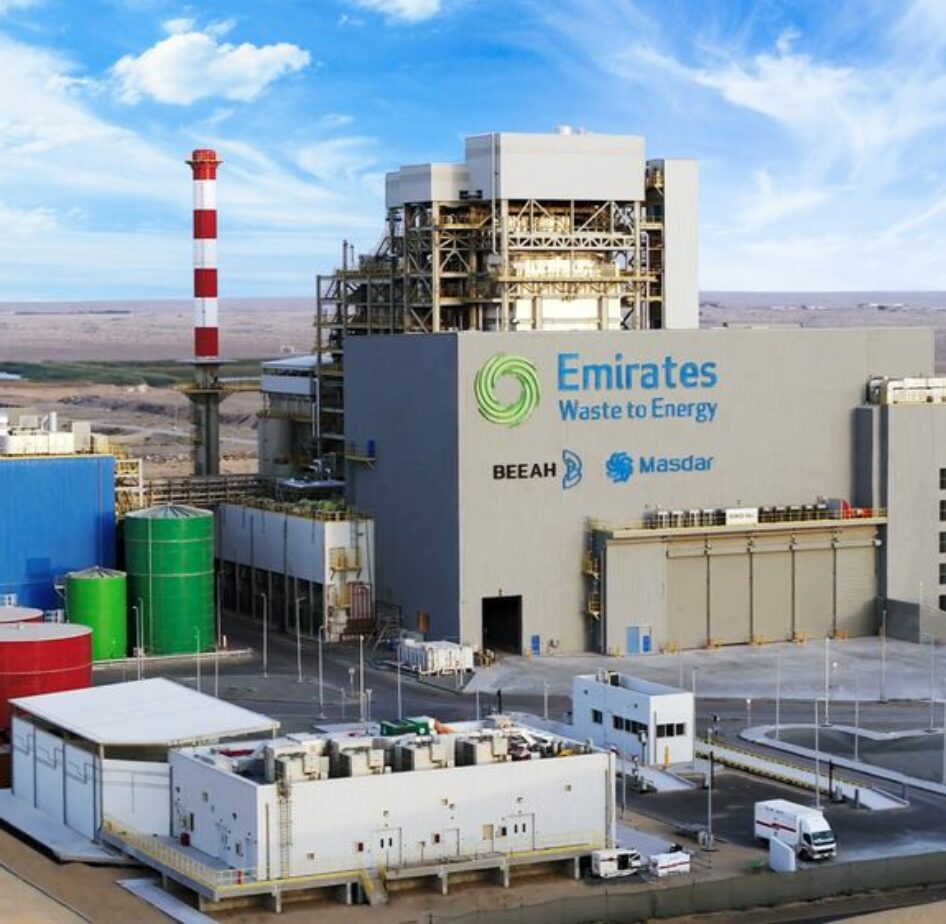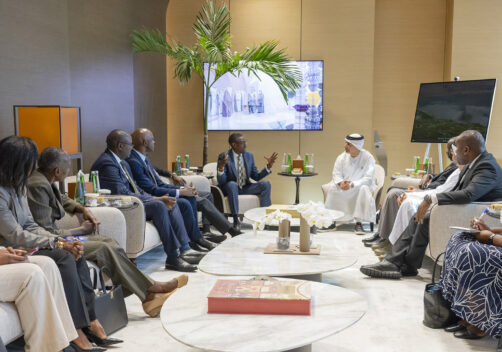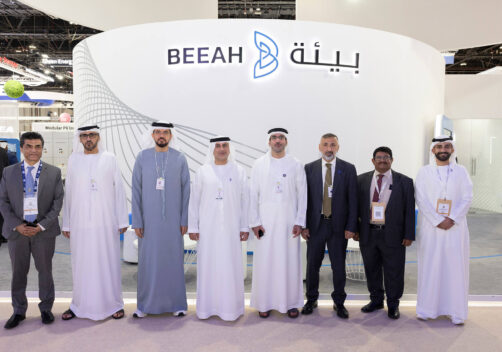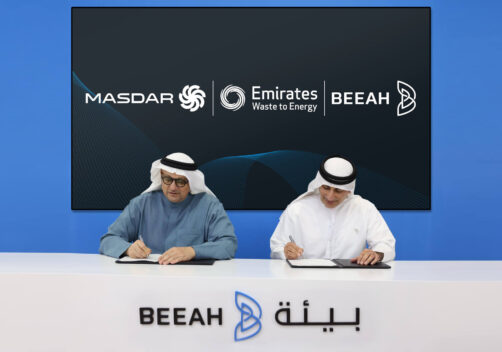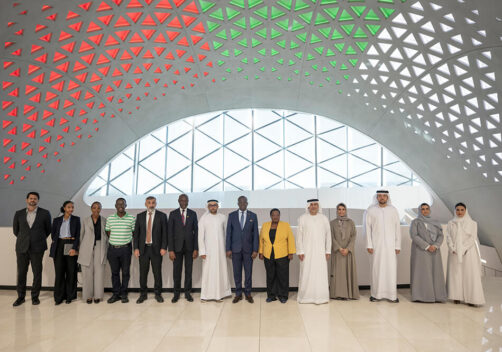- Sharjah Waste to Energy plant example of economic benefits of innovative sustainable energy production.
- Supports UAE’s waste diversion goals and Net Zero by 2050 strategic initiative
- Facility will divert 300,000 tonnes of waste from landfills yearly while producing 30 megawatts of low-carbon electricity
- Project will enable Sharjah to increase waste diversion from 76 percent to 100 percent, making it the Middle East’s first zero-waste city
Sharjah, United Arab Emirates; May 24, 2022: The Emirates Waste to Energy company, a joint venture between BEEAH, the Middle East’s sustainability pioneer, and Masdar, one of the world’s leading renewable energy companies, has announced the inauguration of the Sharjah Waste to Energy plant, the first commercial scale plant of its kind in the Middle East.
The inauguration event was held under the patronage of His Highness Sheikh Dr Sultan bin Muhammad Al Qasimi, Supreme Council Member and Ruler of Sharjah, who officially opened the plant. The event was attended by H.E. Dr Sultan Ahmed Al Jaber, Minister of Industry and Advanced Technology and Chairman of Masdar, H.E Salim bin Mohammed Al Owais, Chairman of BEEAH Group, Masdar Chief Executive Officer Mohamed Jameel Al Ramahi, BEEAH Group Chief Executive Officer Khaled Al Huraimel, and other industry and government leaders.
H.E. Dr Sultan Ahmed Al Jaber, Minister of Industry and Advanced Technology and Chairman of Masdar, said: “The deployment of the first commercial scale waste to energy plant in the Middle East represents a landmark achievement in the UAE’s sustainable economic growth trajectory. By turning waste into energy, this new plant exemplifies the economic benefits of sustainable energy production and a low carbon development pathway. The use of this technology reduces waste and landfill use, creates valuable low carbon energy and introduces a new sustainable industry to our region. Today’s event marks a key milestone in the UAE’s sustainable development and demonstrates the economic impact of the UAE’s Net Zero by 2050 Strategic Initiative. This is the type of practical innovation that the UAE is keen to promote along with domestic and international partners in support of commercially viable climate solutions, in particular as the nation prepares to host COP 28 next year.”
BEEAH Group Chairman H.E Salim bin Mohammed Al Owais said: “This waste-to-energy plant highlights an important next chapter for the UAE and the emirate of Sharjah, which came as a result of the innovative BEEAH-Masdar partnership. For the UAE, this project is a scalable clean energy option to drive towards the national sustainability agenda. In the emirate of Sharjah, we are realizing the Middle East’s first zero-waste city and exploring more ways to contribute to national targets.”
Masdar CEO Mohamed Jameel Al Ramahi said: “Masdar is proud to have partnered with BEEAH to help deliver the UAE’s first waste-to-energy plant, which is also the first in the region at commercial-scale. The Sharjah Waste to Energy plant will not only support the UAE’s net-zero emissions objective, it also addresses the vital issue of waste management – a major problem for many cities in the GCC. I am confident this pioneering project will serve as a shining example for sustainable waste management for other governments in the region for years to come.”
BEEAH Group Chief Executive Officer Khaled Al Huraimel said: “We are proud of the Emirates Waste to Energy partnership with Masdar. With the Sharjah Waste to Energy plant as its inaugural project, the partnership has already realized a new paradigm for a zero-waste, net-zero emissions future. By enabling 100 percent landfill waste diversion in Sharjah and contributing to low-carbon electricity in the UAE, this partnership highlights the clean-energy opportunity in tackling the challenge of unrecyclable waste. I look forward to more collaborations to further widen our impact and leverage the success of the Sharjah Waste to Energy plant across the UAE, the region and beyond.”
While producing energy from unrecyclable waste, the Sharjah Waste to Energy plant also has systems to improve energy efficiency and reduce water consumption. The plant follows the European Union’s Best Available Techniques to align with the strictest environmental standards globally.
The Sharjah Waste to Energy plant, first announced in 2018, will divert up to 300,000 tonnes of waste away from landfills each year, advancing the UAE’s goals for waste management and landfill diversion. The plant will enable Sharjah to increase its current landfill diversion rate from 76 percent to 100 percent, making it the Middle East’s first zero-waste city. If adopted elsewhere, it will also help reduce waste sent to landfills across the UAE.
The project will also displace nearly 450,000 tonnes of carbon dioxide emissions, advancing the UAE’s strategic initiative to achieve net-zero emissions by 2050. The combusted waste will produce 30 megawatts (MW) of low-carbon electricity, enough to power 28,000 homes in Sharjah, and save 45 million m3 of natural gas per year.
The plant works by processing unrecyclable waste at high temperatures and the resulting heat is recovered by a boiler. The boiler then produces steam, which drives a turbine to produce electricity. Bottom ash produced during the process is collected for recovery of metals and ash material, which can be used in construction and roadwork applications. Fly ash is also collected and treated separately.
The plant covers an 80,000 sqm area and is adjacent to the integrated waste management complex operated by BEEAH Recycling, BEEAH Group’s recycling and material recovery business. Unrecyclable waste from the waste management complex will be taken for processing at the Sharjah Waste to Energy plant.
Both Masdar and BEEAH have highlighted the growing importance of waste-to-energy in addressing challenges in the waste management and clean energy industries. As it aims to pioneer waste-to-energy innovations nationally and across the region, the Emirates Waste to Energy company intends for the Sharjah Waste to Energy plant to be the first of many such projects.
Masdar is also active in the waste-to-energy sector in Australia, developing East Rockingham Waste to Energy project in Perth, Western Australia, which is currently under construction. and is also an equity partner in the Maryvale Energy from Waste project in the state of Victoria.
The UAE views progressive climate action and innovative climate solutions as significant opportunities for economic growth. The UAE was the first country in the region to sign and ratify the Paris agreement and the first to commit to an economy-wide reduction in emissions. Last year the UAE was the first country in the MENA region to declare a net zero by 2050 strategic initiative- a vehicle for economic growth, job creation and industrial expansion that is closely aligned to the UAE’s long term development goals. Early investment in diversifying the UAE’s energy mix has already established regional leadership in clean energy, from renewables to nuclear to hydrogen. Today the UAE is home to three of the world’s largest and lowest cost solar plants in the world, with renewable investments in over 40 countries and plans to expand its global portfolio to well over 100 GW by 2030.
